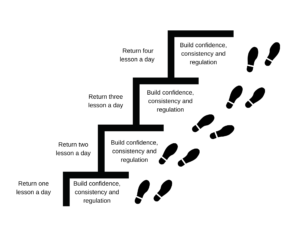Phased Returns and School Avoidance
A frequent conversation I have with my therapist hat on, is surrounding emotionally based school avoidance and return to school plans. Having worked as a teacher, as well as therapist, in addition to supporting many children with return to school plans, the focus is always on:
- Creating a sense of safety for the brain
- Rebuilding confidence
- Rebuilding self-esteem
- Building resilience
The children who are frequently most successful with return to work plans, are those who have incremental increases that allow them to build ‘I can do it’ patterns in their minds. However, what I so often see, is a reluctance from settings to support this, commenting that children should just ‘jump in’ ‘face their fears’ or ‘address it’, which lack an understanding of child brain development.
Children’s brains do NOT function in the same way as adult brains. So, when adults comment to face their fears, they base this information on their own concepts, with a full brain development. However, interestingly, where staff have been off for long periods, we would advocate phased returns – so why don’t we offer the same for children?
The pre-frontal cortex, an area of the brain located in the front of the brain, is responsible for: decision making, logic, analytical thinking, problem solving, planning, attention, impulse control, emotional control, memory and cognitive flexibility.
It is thought that the prefrontal cortex develops from around the age of 12 years old and matures until the age of 25.
Therefore, during this time, children make their decisions based on emotions, rather than logic. In the period whilst the prefrontal cortex is developing, children may struggle with: Sharing, Empathy, Self-control, Recognising the potential consequences of actions, Compassion, Decision making, Managing emotions, Expressing emotions and Anger management.
Therefore, children approach their decisions based on the outcomes of their brain’s interpretations, using the:
- Reptilian Complex – survival functions – which asks ‘am I safe? am I Happy?
- Limbic brain – feelings
Where we overload the reptilian complex with too much at once, it becomes stresses and activates our fight-flight-freeze-fawn response (read more here) this also happens when we make decisions for children, without involving them in the steps that will happen. The reptilian complex can be activated by:
- overload
- stress
- threat
- challenge
Where children are experiencing emotionally based school avoidance, their stress levels are already high. Which is why we review their push and pull factors and how we can minimise these before commencing school return plans. However, where the child’s brain development is not considered, we can see an escalation in symptoms which moves from fear to refusal. Full brain development does not occur until around 25 (although research is now suggesting 27) so this information is imperative to our planning.
To show the brain that they are safe, we want to consider:
- Creating small successes which we build together
- Time to decompress after steps
- Opportunity to plateau for short periods to build confidence
- Regulation strategies to support children
- building strong rapport and teamwork with children and their families
- Safe spaces and support as an ongoing need
Therefore, phased returns often support the child to achieve this. As they allow us to take first steps, regulate and adjust, then repeat. A child attending every day for an hour, is more successful in supporting confidence and self-esteem than attending for one day, dysregulating and then not being able to attend for 3 days whilst they decompress, as we lack the consistency to support the child to have a sense of achievement.
Often, the expectations of the child meet tick box exercises for adults, and fail to appropriately consider a child’s needs. When the child then fails to meet their expectations, the return to school is considered a failure, and children lose trust in the adults supporting them and their confidence drops even further. Whilst their anxiety escalates. Therefore, we so often see failures in return to school programmes.

What can it look like:
- Starting with one lesson a day on a consistent session e.g. lesson 1
- Build confidence over 1-2 weeks
- Add one lesson (or break if lunch)
- Build confidence over 1-2 weeks
- Repeat
- Where children struggle, return to previous step and reintegrate to build safety
The pace and increases in this approach need to:
- Consider the needs of the child
- Be directed by the child’s regulation (in and out of school)
- Account for decompression and regulation time
- Support the child to recognise their achievements
- Be supported with validation and praise for their consistency, commitment and steps
- Note – there is not a one size fits all approach, children will work at their own pace and ability. Reinforce with praise and compassion, avoid negative feedback and criticism
Want to learn more?
Are you looking for a deeper understanding of child mental health? Our Level 4 Child and Adolescent Mental Health Coaching Diploma takes you into an in depth dive of child mental health and how you can support. You can join our Level 4 training (here).
© Dandelion Training and Development – All Rights Reserved
Further help
For more articles about mental health visit – ARTICLES
To learn more about child and adolescent mental health visit – COURSES
For resources to support child and adolescent mental health visit –RESOURCES

